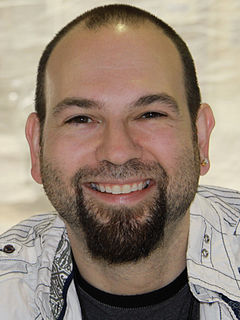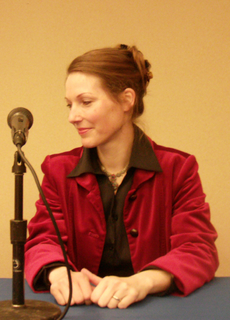A Quote by Tom Stoppard
They loved, and quarreled, and made up, and loved, and fought, and were true to each other and untrue. She made him the happiest man in the whole world and the most wretched, and after a few years she died, and then, when he was thirty, he died, too. But by that time Catullus had invented the love poem.
Related Quotes
She had been ready to love this man from the moment she first saw him. In all these years, that had never changed. They'd hurt each other, let each other down, and yet, here they were after everything, together. She needed him now, needed him to remind her that she was live, that she wasn't alone, that she hadn't lost everything.
Love makes you weak. This I know for sure. Mom loved Roger. Roger loved Mom.And look what happpened there. She died. She thought her love made her strong. She kept telling me-after she was diagnosed-she ket telling me, "I'm going to beat this Kyra. I'm going to come out of it. I love you and I love your father and that love is my strength. You're my strength.
Yet at the last Beren was slain by the Wolf that came from the gates of Angband, and he died in the arms of Tinúviel. But she chose mortality, and to die from the world, so that she might follow him; and it is sung that they met again beyond the Sundering Seas, and after a brief time walking alive once more in the green woods, together they passed, long ago, beyond the confines of this world. So it is that Lúthien Tinúviel alone of the Elf-kindred has died indeed and left the world, and they have lost her whom they most loved.
She had witnessed the world's most beautiful things, and allowed herself to grow old and unlovely. She had felt the heat of a leviathan's roar, and the warmth within a cat's paw. She had conversed with the wind and had wiped soldier's tears. She had made people see, she'd seen herself in the sea. Butterflies had landed on her wrists, she had planted trees. She had loved, and let love go. So she smiled.
He lifted his gaze to the framed photograph of Tanya and him taken on their wedding day. God, she had been lovely. Her smile had come through her eyes straight from her heart. He had known unequivocally that she loved him. He believed to this day that she had died knowing that he loved her. How could she not know? He had dedicated his life to never letting her doubt it.
June Jordan, who died of cancer in 2002, was a brilliant, fierce, radical, and frequently furious poet. We were friends for thirty years. Not once in that time did she step back from what was transpiring politically and morally in the world. She spoke up, and led her students, whom she adored, to do the same.
She was made up of more, too. She was the books she read in the library. She was the flower in the brown bowl. Part of her life was made from the tree growing rankly in the yard. She was the bitter quarrels she had with her brother whom she loved dearly. She was Katie's secret, despairing weeping. She was the shame of her father stumbling home drunk. She was all of these things and of something more...It was what God or whatever is His equivalent puts into each soul that is given life - the one different thing such as that which makes no two fingerprints on the face of the earth alike.
And she loved a man who was made out of nothing. A few hours without him and right away she’d be missing him with her whole body, sitting in her office surrounded by polyethylene and concrete and thinking of him. And every time she’d boil water for coffee in her ground-floor office, she’d let the steam cover her face, imagining it was him stroking her cheeks, her eyelids and she’d wait for the day to be over, so she could go to her apartment building, climb the flight of stairs, turn the key in the door, and find him waiting for her, naked and still between the sheets of her empty bed.
She imagines him imagining her. This is her salvation. In spirit she walks the city, traces its labyrinths, its dingy mazes: each assignation, each rendezvous, each door and stair and bed. What he said, what she said, what they did, what they did then. Even the times they argued, fought, parted, agonized, rejoined. How they’d loved to cut themselves on each other, taste their own blood. We were ruinous together, she thinks. But how else can we live, these days, except in the midst of ruin?
Sometimes a woman's love of being loved gets the better of her conscience, and though she is agonized at the thought of treating a man cruelly, she encourages him to love her while she doesn't love him at all. Then, when she sees him suffering, her remorse sets in, and she does what she can to repair the wrong.
His parents never talked about how they met, but when Park was younger, he used to try to imagine it. He loved how much they loved each other. It was the thing he thought about when he woke up scared in the middle of the night. Not that they loved him--they were his parents, they had to love him. That they loved each other. They didn't have to do that.
I don't believe in regretting - one should try to move on. My mum was good at that. She was deeply in love with my father, and he died when I was nine. She remarried, and her second husband died, too. I saw the grieving process she went through. My mother had this way of moving on. It was a fine trait.
She had died peacefully, in her sleep, after an evening of listening to all of her favorite Fred Astaire songs, one crackling record after another. Once the last chord of the last piece had died out, she had stood up and opened the French doors to the garden outside, perhaps waiting to breathe in the honeysuckle one more time.
After my mother died, I learned that she'd had a scholarship to the University of Nebraska, but - in kind of a tradition that females don't do things like that - her father prevented her from going. She always said that she wasn't allowed to go to college, but until she died, I never knew that she'd had this scholarship.





































